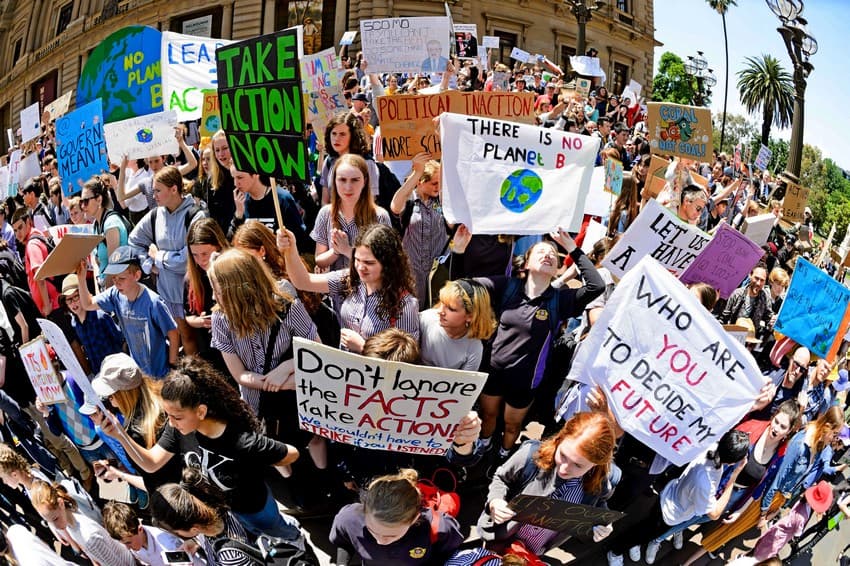Under the iconic clock tower of the Sydney Town Hall, a blond pre-teen wears a wry expression. Among many others, his placard stands out. It says, “Don’t Mess With My Future”, the ‘o’ replaced with a 🙁 . Youngsters like him are coming of age too soon. They have big worries. Time is running out they say, via loud and bold placards. They are the climate change generation.

Photo caption: Young people at the school strike for climate in Melbourne, in November 2018. (Photo by Julian Meehan on Flickr – CC 2.)
Young people and children have a reason to worry about their future, and to hold the older generation accountable. Through their lives, children born in 2020 will experience extreme climate events, particularly heat waves, at a rate that will be two to seven times higher than people born in 1960, according to a study published in September 2021 in the journal Science. Aptly titled ‘Intergenerational inequities in exposure to climate extremes’, the study takes a ‘cohort’ perspective to quantify changes in lifetime exposure to climate extremes, and compares them across generations. The results appear startling at first, but can also be unsurprising for those who care to notice the effects of climate change in their, and others’ lives. For the younger generation, the study just validates the clear messages on their placards.
Comparing a person born in 1960 to a child who was six in 2020, the authors of the study make a relatable grandparent-grandchild comparison. The grandchild will experience twice as many cyclones and wildfires, three times as many river floods, four times as many crop failures and five times as many droughts, as their grandfather. These comparisons reiterate an assertion made by 17 leading ecologists from around the world in January this year. In a bluntly worded paper titled “Underestimating the Challenges of Avoiding a Ghastly Future”, published in Frontiers in Conservation Science, they wrote that “humanity is running an ecological Ponzi scheme in which society robs nature and future generations to pay for boosting incomes in the short term.”
Robbing future generations of a future is a sobering thought to say the least. Apart from the fact that those responsible for the ongoing climate crisis won’t be alive to witness and suffer its worst consequences, the vulnerability of children to extreme weather and other climate catastrophes is a revelation the world is just waking up to. In August 2021, the UNICEF released a report titled ‘The Climate Crisis is a Child Rights Crisis’, which introduced the new Children’s Climate Risk Index (CCRI). The index uses data to generate new global evidence on how many children are currently exposed to climate and environmental hazards, shocks and stresses. According to the report, over a third of children globally are highly exposed to heatwaves, nearly one in six to cyclones, one in seven to riverine flooding, one in ten to coastal flooding, over a third to water scarcity, over one in four to vector-borne diseases, almost 90 percent to air pollution, and over a third to lead pollution.
The report also explains how children are more vulnerable to climate and environmental shocks than adults. They are physically more vulnerable, and less able to withstand and survive shocks such as floods, droughts, severe weather and heatwaves. They are physiologically more vulnerable: toxic substances, such as lead and other forms of pollution, even at lower doses of exposure, affect children more than adults. Diseases that are likely to be exacerbated by climate change, such as malaria and dengue, kill more children than adults. The report does not discuss the effects of environmental shocks and stresses on the mental health of children.
A paper published in Clinical Psychological Science in September 2021 takes a close look at the mental health consequences of climate change for children. The authors argue that climate change is already affecting the healthy psychological development of children worldwide. Discussing the effects of environmental shocks and stresses on a child right from the fetal stage to 14.5 years, which is considered the peak age of onset for psychiatric disorders, they explain how climate change is ‘turning up the heat on this pressure-cooker life stage’.
Evidence that we are eroding the future of young and coming generations is mounting every day. Every week, a new scientific paper sounds an alarm about the state of the planet, and the future of humanity. Climate scientists are now directly appealing to governments, corporations, and the collective conscience of humanity. In each of their reports, there is a faint glimmer of hope, a possibility of escape. If all countries seriously mobilise to cut emissions drastically to limit warming, climate catastrophes can be avoided, and we can bequeath our children a liveable planet. If we refuse to immediately wake up from our slumber of climate indifference, we will have crossed too many tipping points for our actions to have any impact.
——————————————————————————————————————————————————————
About the author: Rizwan Mithawala is a Conservation Writer with the Wildlife Conservation Trust and a Fellow of the International League of Conservation Writers. He has previously worked as an environment journalist with a national newspaper.
Disclaimer: The author is associated with Wildlife Conservation Trust. The views and opinions expressed in the article are his own and do not necessarily reflect the views and opinions of Wildlife Conservation Trust.
——————————————————————————————————————————————————————
Your donations support our on-ground operations, helping us meet our conservation goals.
——————————————————————————————————————————————————————
Related Links
- Sleepwalking into a Ghastly Future
- Why Won’t We Acknowledge the Mammoth in the Room
- Porpita porpita – Holding a Mirror to Mankind

